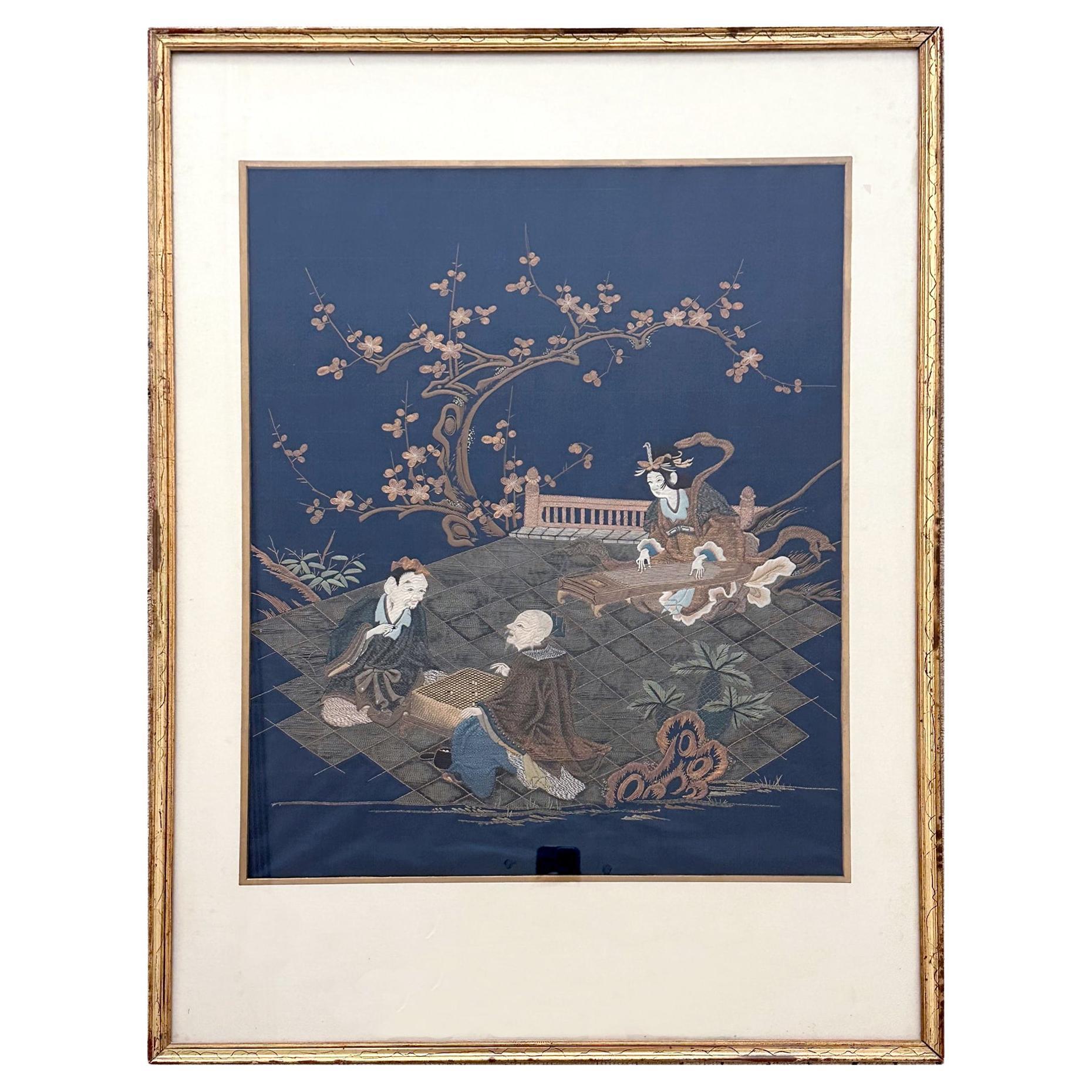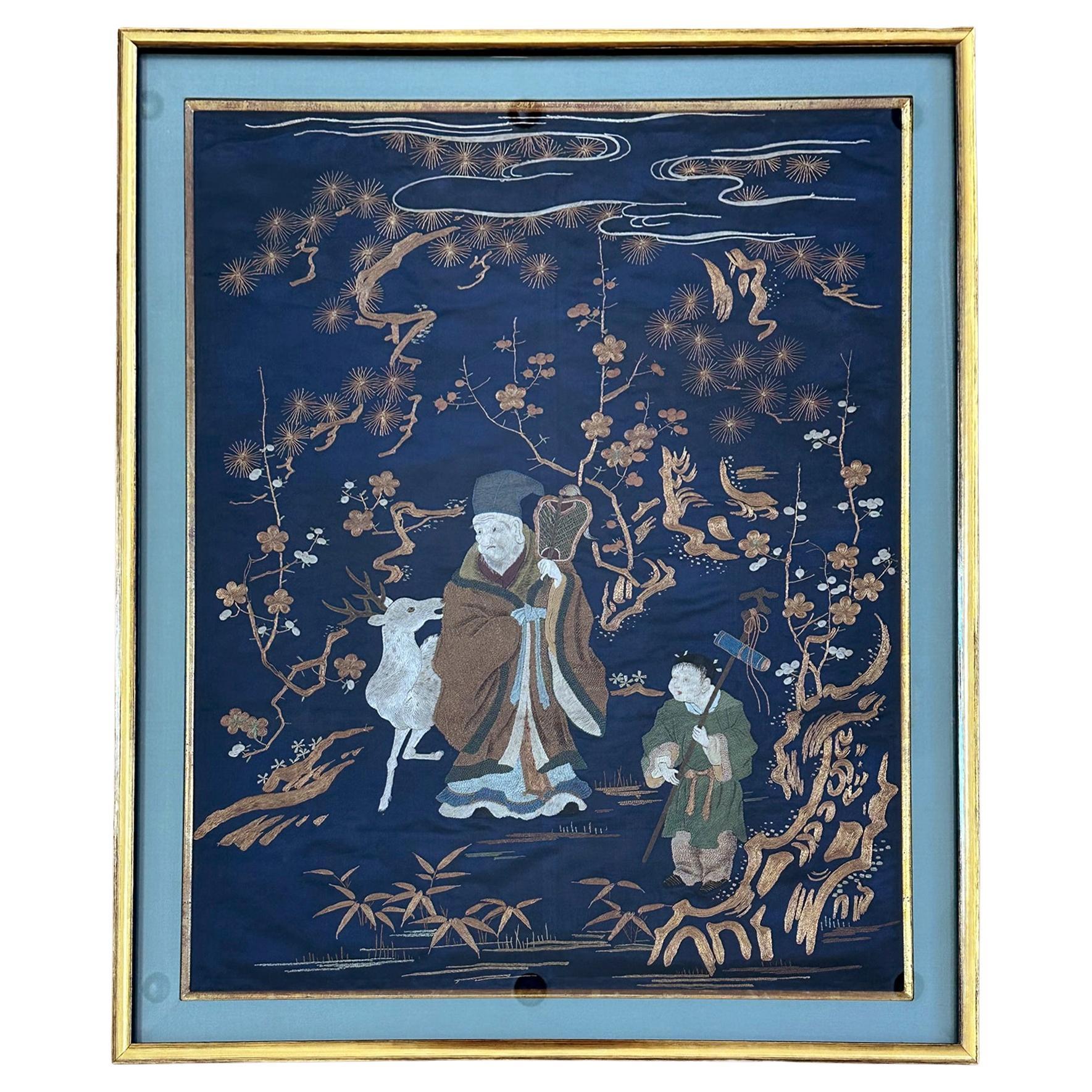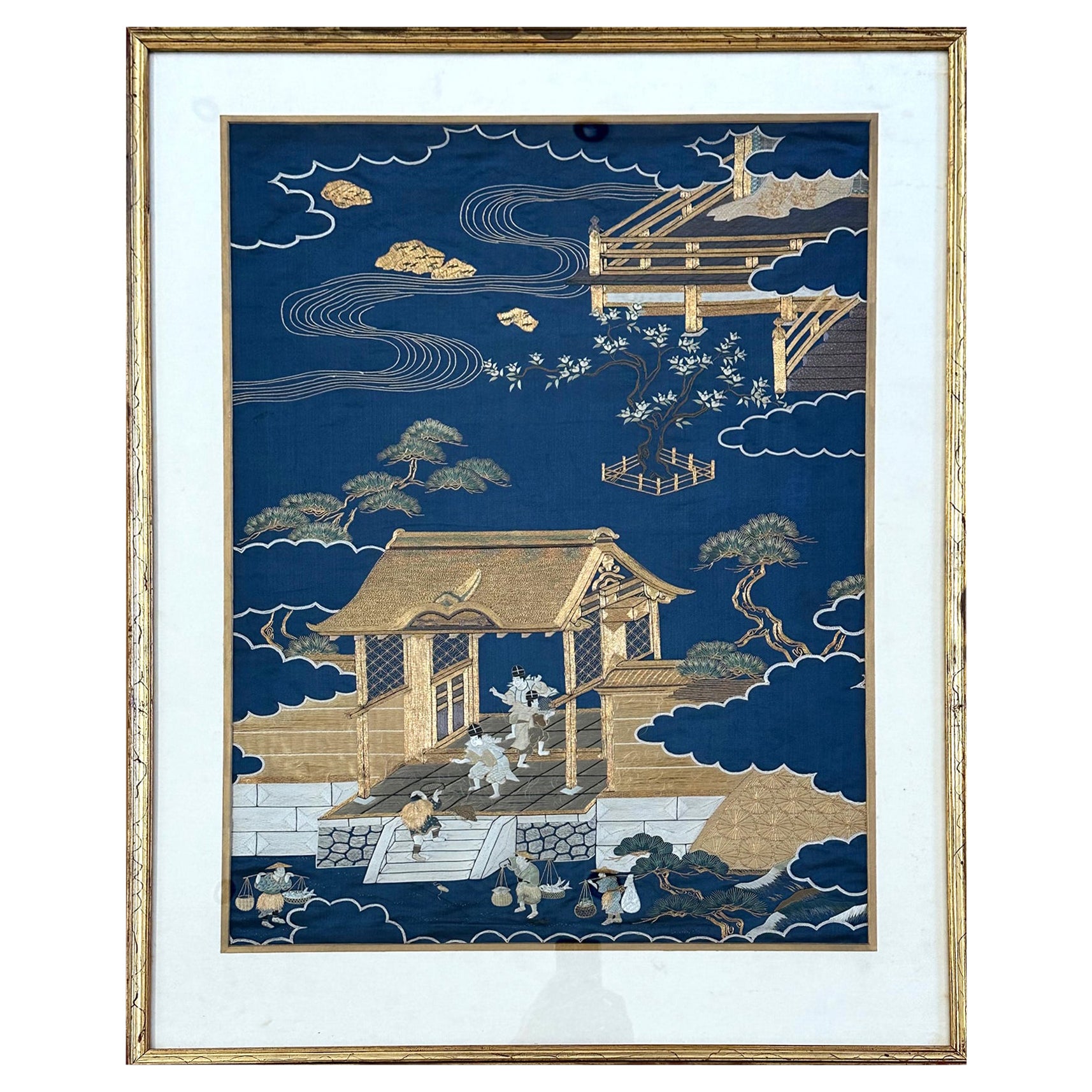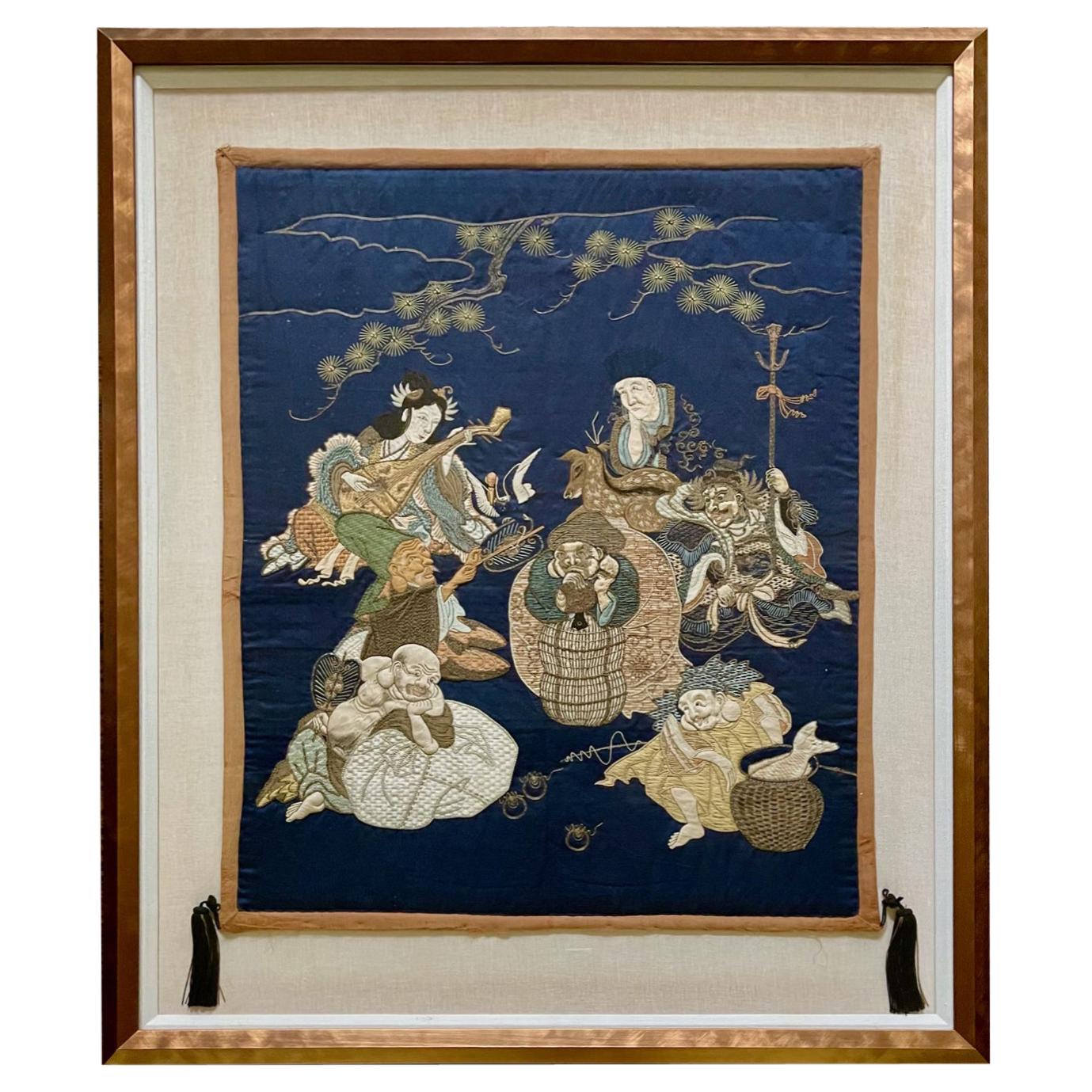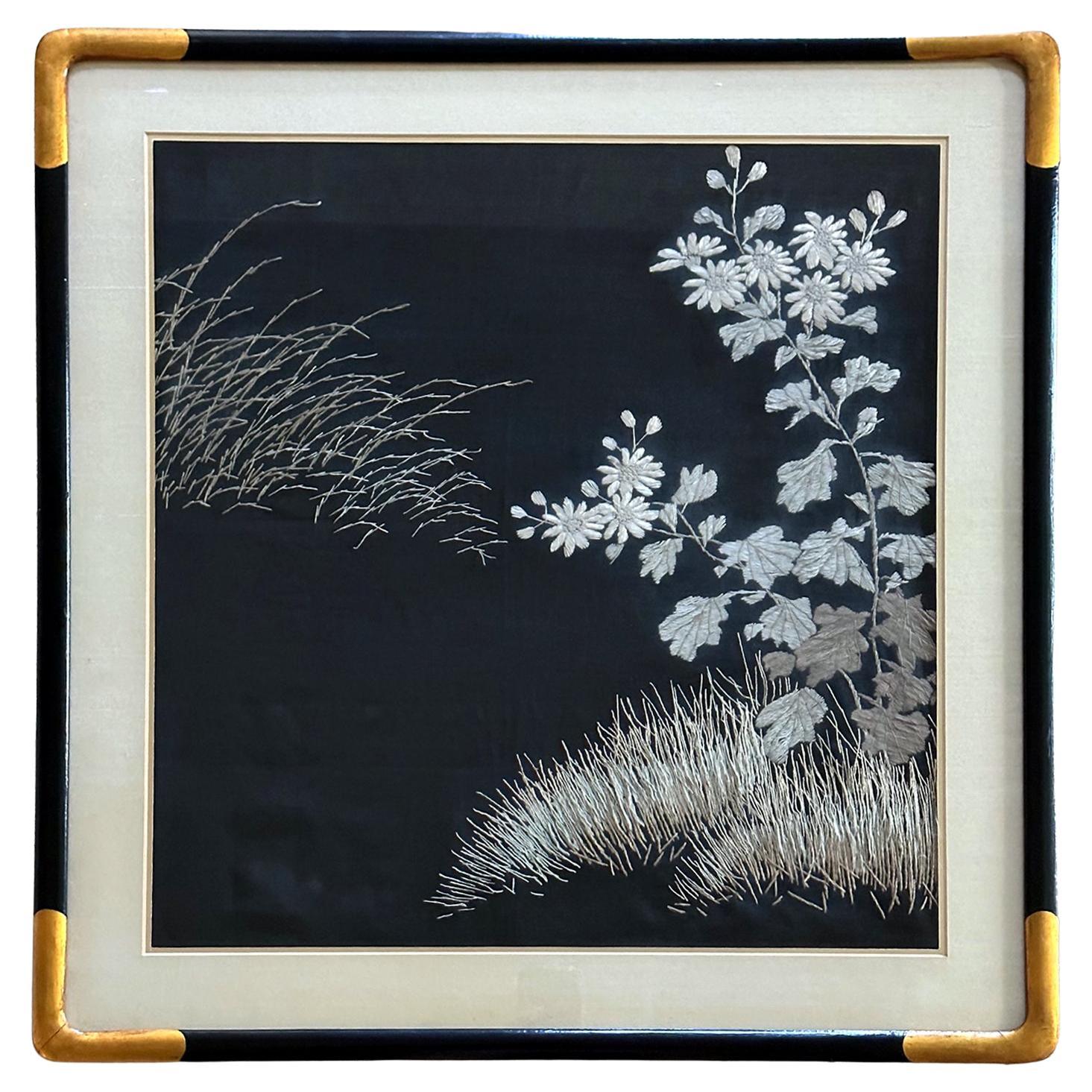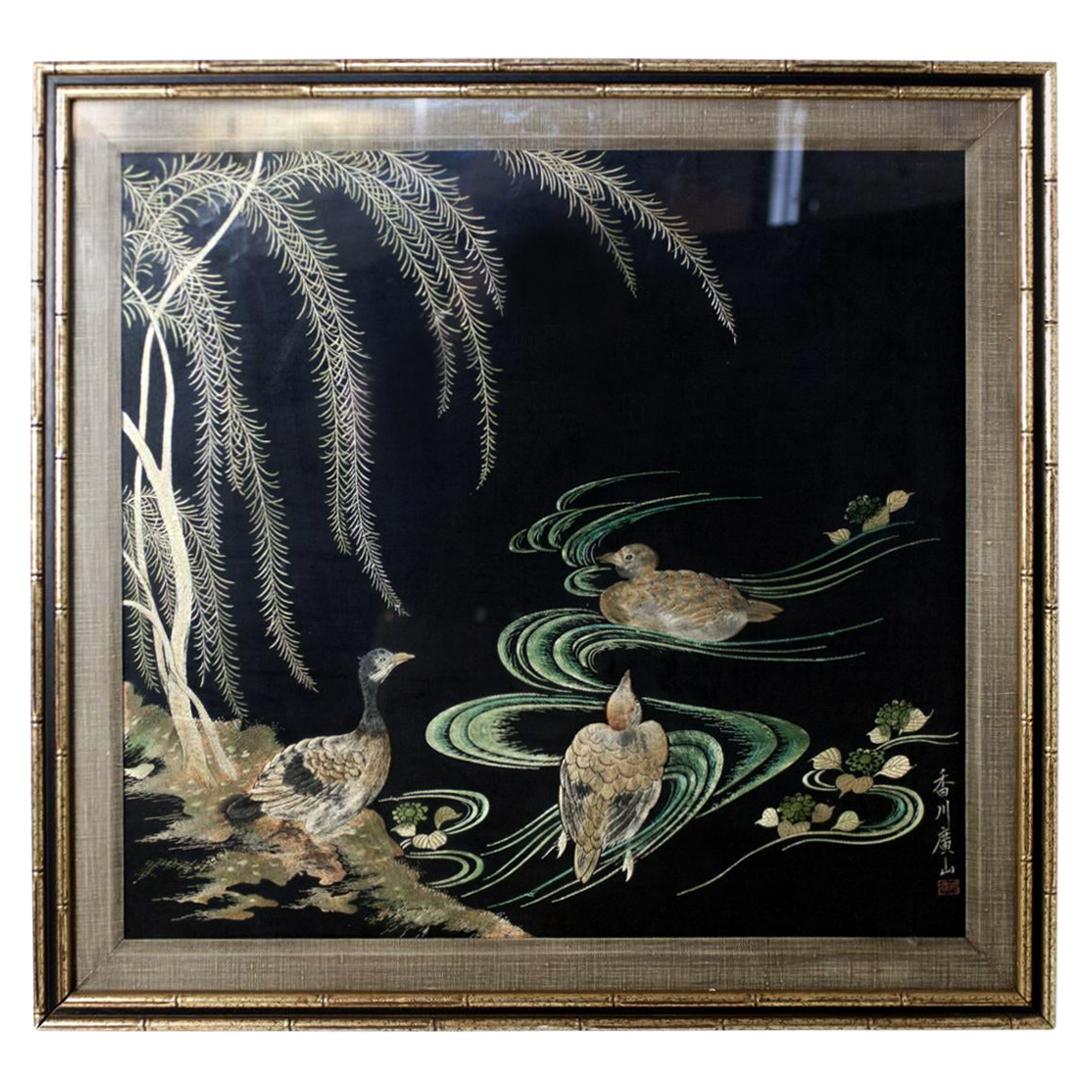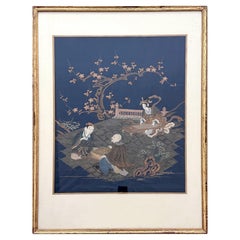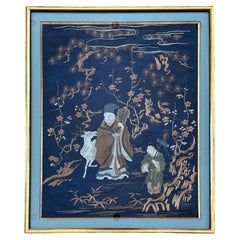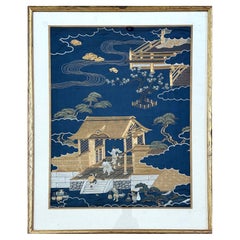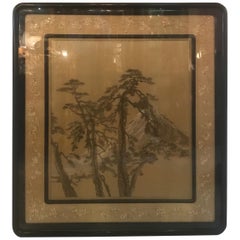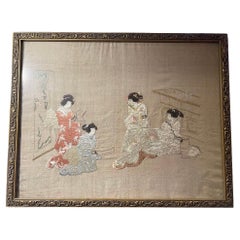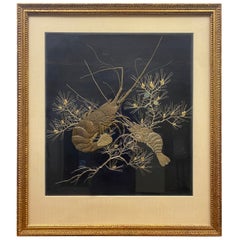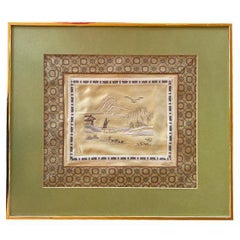Items Similar to Framed Antique Japanese Embroidery Fukusa Panel
Want more images or videos?
Request additional images or videos from the seller
1 of 17
Framed Antique Japanese Embroidery Fukusa Panel
$4,500
£3,440.49
€3,962.75
CA$6,305.88
A$7,039.92
CHF 3,688.81
MX$86,175.55
NOK 46,847.96
SEK 44,171.68
DKK 29,574.40
Shipping
Retrieving quote...The 1stDibs Promise:
Authenticity Guarantee,
Money-Back Guarantee,
24-Hour Cancellation
About the Item
A finely embroidered Japanese silk Fukusa panel presented in a beautiful brocade-wrapped fame. Circa late 19th century of Meiji Period, Fukusa is a traditional Japanese textile art used to wrap and present gifts at important occasions. Depending on the occasion, the panel itself can be a very fine textile art on its own. On the deep blue background, this elaborate textile art depicts an old man with long beard and a protruding forehead. He represents Fukurokuju, the deity of longevity and wisdom in Japanese folklore, derived from "The Old Man of the South Pole" in Chinese mythology. He is seen with a crane on his back, a bird that is also a symbol of long life. Holding a cane in one hand, he opens a scroll on the other to an old couple, showing them the painting of an old pine tree in front of Mount Fuji. The old couple is Jotomba (Joo and Uba are their names), characters in the Legend of Takasago, one of the oldest Japanese mythologies, who are associated with old pines.
"At Takasago Shrine there is a very old pine tree, the trunk of which is bifurcated; in it dwells the spirit of the Maiden of Takasago who was seen once by the son of Izanagi who fell in love and wedded her. Both lived to a very great age, dying at the same hour on the same day, and since then their spirits abide in the tree, but on moonlight nights they return to human shape to revisit the scene of their earthly felicity and pursue their work of gathering pine needles. His pine tree is called “The Pine of Suminoe” while hers is "Takasago pine". The old woman is using a broom to sweep away troubles and he carries a rake to rake in good fortune. In front of the old couple, there is also a Minogame, the long-lived turtle with long strands of algae growing from their shells. Another famous Japanese symbol of longevity.
In Japan, Takasago couple is associated with wedding ceremony as they invoke a long and fruitful married life for the newlyweds. It is most likely that the fukusa was used to wrap an important wedding gift. The embroidery work on this large Fukusa is impressive in its details. To create this piece, a wide range of techniques were used masterfully when viewed in detail. A fine piece full of auspicious symbolism.
The panel itself is 22,75" W x 23.75" H.
- Dimensions:Height: 29 in (73.66 cm)Width: 29 in (73.66 cm)Depth: 2 in (5.08 cm)
- Style:Meiji (Of the Period)
- Materials and Techniques:
- Place of Origin:
- Period:
- Date of Manufacture:Late 19th Century
- Condition:Wear consistent with age and use. Fine condition, not examined out of the frame. the wood frame shows come wear, brocade border is in good condition.
- Seller Location:Atlanta, GA
- Reference Number:1stDibs: LU945031631612
About the Seller
4.9
Platinum Seller
Premium sellers with a 4.7+ rating and 24-hour response times
Established in 2006
1stDibs seller since 2010
565 sales on 1stDibs
Typical response time: <1 hour
- ShippingRetrieving quote...Shipping from: Atlanta, GA
- Return Policy
Authenticity Guarantee
In the unlikely event there’s an issue with an item’s authenticity, contact us within 1 year for a full refund. DetailsMoney-Back Guarantee
If your item is not as described, is damaged in transit, or does not arrive, contact us within 7 days for a full refund. Details24-Hour Cancellation
You have a 24-hour grace period in which to reconsider your purchase, with no questions asked.Vetted Professional Sellers
Our world-class sellers must adhere to strict standards for service and quality, maintaining the integrity of our listings.Price-Match Guarantee
If you find that a seller listed the same item for a lower price elsewhere, we’ll match it.Trusted Global Delivery
Our best-in-class carrier network provides specialized shipping options worldwide, including custom delivery.More From This Seller
View AllFramed Antique Japanese Embroidery Fukusa Textile Panel
Located in Atlanta, GA
A Japanese silk Fukusa Panel housed in a gilt frame circa late 19th century of Meiji Period. Fukusa is a traditional Japanese textile art used as a wrap for presenting gifts at important occasions. On the deep blue background, the elaborate embroidery work depicts three deities of the Shichifukujin (Seven Gods of Fortune...
Category
Antique Late 19th Century Japanese Meiji Textiles
Materials
Silk, Wood
Framed Antique Japanese Embroidery Fukusa Panel
Located in Atlanta, GA
A finely embroidered Japanese silk Fukusa panel presented in a beautiful silk-lined giltwood frame (newly framed and glazed), circa late 19th century of Meiji Period. Fukusa is a tra...
Category
Antique Late 19th Century Japanese Meiji Textiles
Materials
Silk, Wood
Framed Antique Japanese Embroidery Fukusa Textile Panel
Located in Atlanta, GA
A Japanese silk Fukusa Panel housed in a gilt frame circa late 19th century of Meiji Period. Fukusa is a traditional Japanese textile art used as a wrap for presenting gifts at important occasions. On the deep blue background, the elaborate embroidery work depicts a historical scene where street vendors selling goods to a royal household or an aristocratic residence. The scene focuses on the activities at the front gate where the couriers and servants were busying carrying the goods in. A peasant with straw coat...
Category
Antique Late 19th Century Japanese Meiji Textiles
Materials
Silk, Wood
Framed Antique Japanese Silk Embroidery Fukusa Textile Panel
Located in Atlanta, GA
A Japanese Fukusa Panel with tassels displayed in a gilt frame circa Meiji Period. Fukusa is a traditional Japanese textile art used as a...
Category
Antique Late 19th Century Japanese Meiji Textiles
Materials
Silk, Wood
Framed Japanese Embroidery Textile Panel Meiji Period
Located in Atlanta, GA
A Japanese textile panel with embroidery needlework circa late Meiji period (1900s) presented in a gilt wood frame with silk mat. The work depic...
Category
Antique Early 1900s Japanese Meiji Textiles
Materials
Silk, Wood
Framed Antique Japanese Embroidered Silk Panel Signed
Located in Atlanta, GA
An exquisite Japanese embroidery piece circa end of 19th-early 20th century of Meiji period. The silk panel depicts an idyllic water scenery, in which three mandarin ducks swim in th...
Category
Early 20th Century Japanese Japonisme Textiles
Materials
Silk, Wood
You May Also Like
Antique Early 20th Century Japanese Hand Stitched Silk Framed Tapestry
Located in Lambertville, NJ
All hand work framed silk Japanese tapestry with embroidered boarder. A deep custom black lacquered frame. Originaly sold from Newman Galleries....
Category
Early 20th Century Japanese Meiji Textiles
Materials
Silk, Glass, Lacquer
Mid-20th Century Japanese silk embroidered framed painting
Located in Delft, NL
Mid-20th Century Japanese silk embroidered framed painting
A silk embroidered painting and is framed behind glass with a scene of women in ...
Category
Mid-20th Century Japanese Paintings and Screens
Materials
Silk
Framed Embroidered Japanese Kimono
Located in Nashville, TN
Japanese gold couched thread embroidered scene of two shellfish on a black silk kimono remnant. Mounted inside a gilt frame.
Circa 1890-1900.
Category
Antique 1890s Japanese Japonisme Textiles
Materials
Silk
$1,440 Sale Price
47% Off
Antique Japanese Framed Embroidered Scene of Traditional Garden Life
Located in Oklahoma City, OK
A beautiful piece with an incredible history. This exquisite hand-embroidered tapestry was created in Japan and purchased by an American man who taught English. The scene depicts a t...
Category
20th Century Japanese Anglo-Japanese Textiles
Materials
Metal
$480 Sale Price
20% Off
Framed Antique Chinese Qing Dynasty Embroidery 25LP007
Located in Pomona, CA
Originally purchased from Hong Kong, this Chinese antique embroidery presented in a museum quality. This textile was a roundel design likely from the center front of a noble woman's...
Category
Early 20th Century Chinese Chinese Export Textiles
Materials
Silk
Late Edo period Tsutsugaki 筒描 Auspicious Shishi Batik Screen
Located in Fukuoka, JP
Auspicious Shishi Batik Screen
Period: Late Edo
Size: 145x173 cm (57x68 inches)
SKU: PTA62
Step into the mythical world of late Edo Japan with our radiant batik screen depicting the...
Category
Antique 19th Century Japanese Edo Paintings and Screens
Materials
Cotton, Wood
More Ways To Browse
Framed Textile
Textile Front
Framing Antique Textiles
Embroidery Framed
Wood Scroll Panel
Dior Asia
Framed Textile Panel
Antique Silk Embroidery Art
Silk Embroidery Frame
Japanese Silk Panel
Japanese Meiji Panel
Antique Shell Frame
Japanese Embroidery
Framed Japanese Textiles
Japanese Shrine
Crane Panel
Japanese Crane Art
Japanese Art Of Cranes
